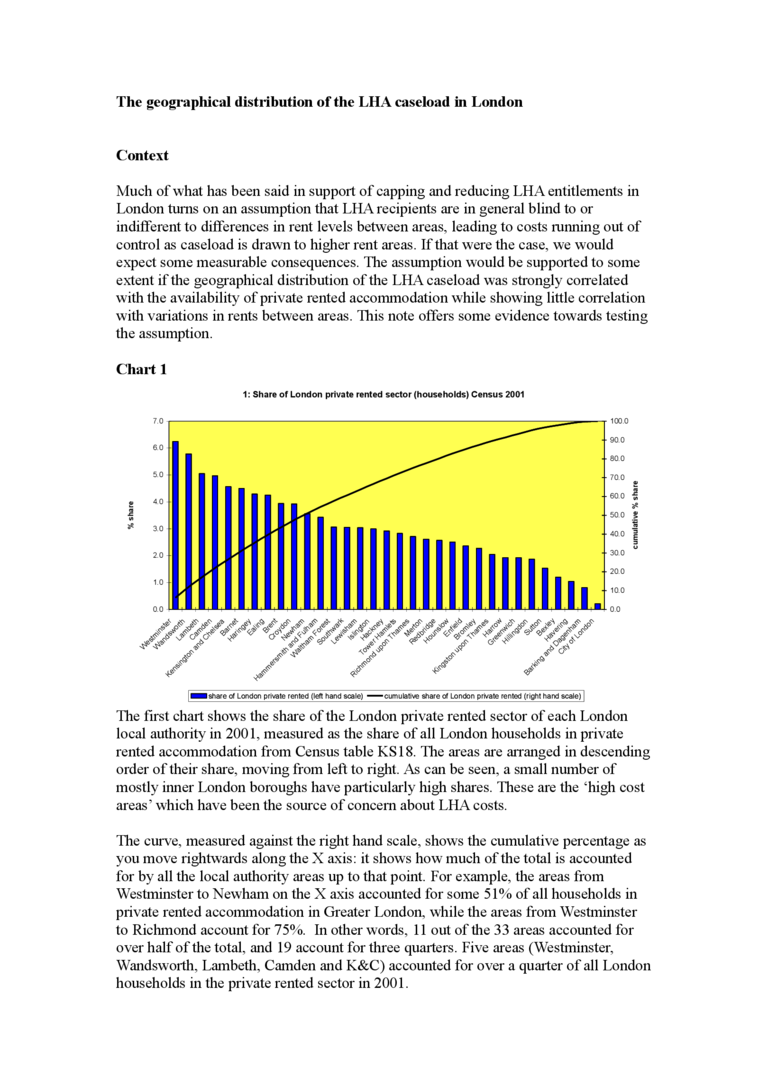The distribution of private rented accommodation in London

[Description: An unpublished article from 2010 dusted off in the light of today's coverage of housing benefit cuts in London (word document attached at foot of this post)]
"To live in Westminster is a privilege, not a right, because so many people want to live here," a Westminster council press officer explains in the Guardian. http://www.guardian.co.uk/society/2012/feb/16/housing-benefit-cap-famili...
Let's ignore the assertion that living in Westminster is a privilege rather than a right (it is neither). Westminster council appears to believe that their housing benefit caseload is a tribute to the attractiveness of their area.
That might sound persuasive if Westminster evokes images of Mayfair or Belgravia rather than the overpriced bijou slums familiar to the borough's housing advice workers. People are claiming housing benefit in Westminster and other wealthy London boroughs not because these are attractive places to live or because they are indifferent to exorbitant rents, but because that is where the accommodation is. Westminster, like other central London boroughs, has a disproportionate share of the capital's private rented sector.It also has a disproportionately low share of the caseload for Local Housing Allowance (LHA, i.e. housing benefit for private renters). But LHA claimants do find themselves in Westminster, because the deterrent effect of high rents is partly offset by the constrained supply of rented accommodation elsewhere in the capital.
The attached article (below) gives the detail on how the price and supply of rented accommodation interact to determine the location of LHA claimants. Rents have a huge impact: a one per cent increase in rent relative to the London average reduces the local share of the LHA caseload by more than one per cent. But the supply constraint means that a one per cent increase in the local share of the private rented sector increases the share of the LHA caseload, again by more than one per cent, at least for one-bed flats. The implication is that tenants' decisions are largely explained by price and supply. The attractiveness of Westminster can be rejected as an explanatory factor: if that was what drove the LHA caseload, we'd have to explain why Croydon is so much more attractive: it has a much bigger share of the LHA caseload compared to its share of rented accommodation. (I am not suggesting that Croydon is not attractive, nor am I endorsing Westminster's evaluation of its own attractiveness.)
This raises an obvious question about the impact of the government's policies. Where will people go? 'They'll move to lower rent areas' is the stock answer. But they are already moving to lower rent areas, and have been for years. The implication is that people are expected to move out of London altogether. 'Poor people shouldn't live in London', I was once told by a junior Treasury civil servant. That 'poor people' don't know where they should be living and that the choice therefore needs to be taken on their behalf are the unchallenged assumptions underpinning the government's policies- the point is not partisan, as the previous government proposed very similar albeit slightly less merciless policies. (Declaration of interest: I worked for the last government when this was under discussion.)
It never pays to assume that people are irrational. The basic analysis in the attached article indicates that LHA claimants' decisions on where to live are informed by rent levels in the expected manner: tenants are in general neither myopic about nor indifferent to rents. If they are paying high rents for low quality flats in Westminster, that is telling us something about the supply of accommodation in London, not their ability to make a rational choice as to where they should live. But where would policy on poverty be if government were to drop the assumption that people in poverty don't know what they are doing?